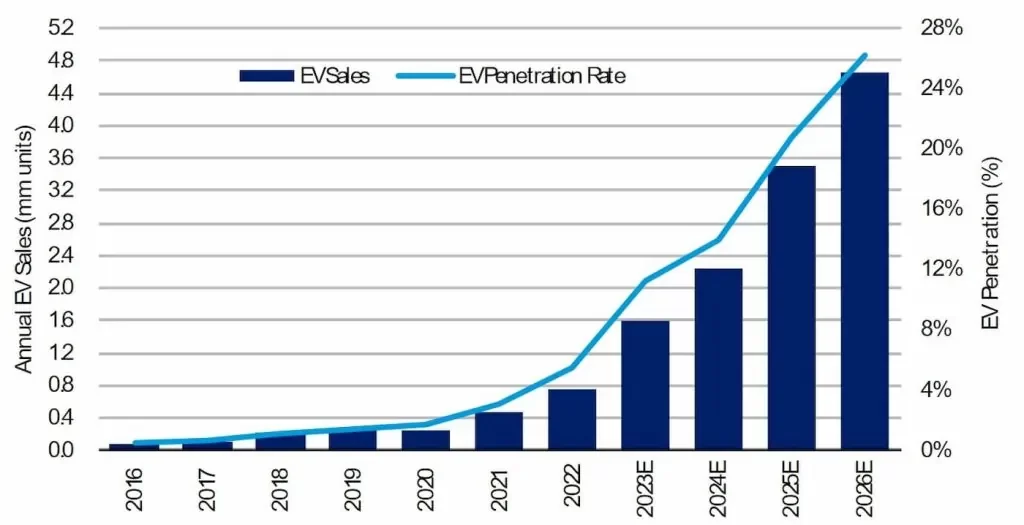
The automobile industry is undergoing a massive shift, with many companies now pivoting towards electric vehicles (EVs). Ford, GM, and Stellantis (formerly Fiat Chrysler) are among those making the biggest strides in the US EV market.
According to a recent report, a popular EV news publication, Ford, GM, Stellantis Gain Most US EV market share over the past year. In this article, we’ll take a closer look at the factors driving this trend and what it could mean for the future of the auto industry.
The Rise of Electric Vehicles

The shift towards electric vehicles isn’t just limited to a few automakers. It’s a global phenomenon that’s gaining momentum every day. In 2020, global EV sales reached a record 3.24 million vehicles, up 43% from the previous year. This trend is expected to continue, with some experts predicting that EVs could account for 50% of new car sales by 2030.
There are several reasons for the rise of electric vehicles. First and foremost, they are more environmentally friendly than gasoline-powered cars. EVs emit zero emissions or close to it, depending on how their electricity is generated, which can help reduce air pollution and combat climate change.
Also read: Ford has Become the First Automaker to Manufacture both NMC and LFP Batteries for EVs in the USA
In addition, EVs offer a range of benefits that are attracting more and more consumers. For one, they are cheaper to operate than traditional cars. Electricity costs less than gas, and EVs require less maintenance because they have fewer moving parts. EVs are also silent, smooth, and fun to drive, with instant torque and acceleration that beats many gas cars.
Another factor driving the rise of EVs is government support. Many countries around the world, including the US, are offering tax incentives and other benefits for EV buyers. This can make electric cars more affordable and attractive to a wider range of consumers.
Ford, GM, and Stellantis’ EV Market Share Gains
With all these trends in mind, it’s no surprise that automakers are investing heavily in electric vehicles. Among them, Ford, GM, and Stellantis have made some of the most significant strides in the US EV market.
According to Electrek’s report, these companies gained the most US EV market share in the first quarter of 2021. Ford saw the biggest increase, with its share of US EV sales jumping from just 2.1% in Q1 2020 to 10.6% in Q1 2021, a gain of over 400%. GM and Stellantis also saw significant gains, with their market shares increasing from 6.6% to 16.3% and 2.2% to 9.5%, respectively.
So what’s driving these companies’ gains? There are several factors at play. For one, all three companies have made significant investments in EV technology and are now offering a range of electric models to consumers. For example, Ford has launched the Mustang Mach-E electric SUV, while GM has rolled out the Chevy Bolt and is set to release the GMC Hummer EV later this year. Stellantis is also planning to launch a number of new electric models in the coming years.
These automakers are also benefiting from the overall increase in demand for EVs, as consumers become more interested in cleaner, more efficient cars. In addition, government incentives and mandates, such as California’s zero-emissions vehicle (ZEV) standard, are helping to drive demand for EVs and put pressure on automakers to offer more electric models.
Challenges Ahead

While the rise of electric vehicles is certainly promising, there are also significant challenges ahead. One of the biggest is the lack of charging infrastructure, particularly in rural or remote areas where EVs may be less practical. In addition, EVs still face range anxiety concerns, as some drivers worry about running out of power on long trips.
Another challenge is the cost of electric vehicles. While prices are coming down, EVs are still more expensive than traditional cars in many cases. This can make them less accessible to lower-income consumers, who may not be able to take advantage of government incentives or afford the upfront cost of an electric car.
Finally, there is the issue of battery production and supply chain concerns. EVs rely on lithium-ion batteries, which require rare earth metals and other materials that can be difficult to source sustainably. As demand for EVs increases, there may be supply chain disruptions or issues with sourcing these materials ethically.
Conclusion
Despite these challenges, the rise of electric vehicles is a trend that’s likely to continue and accelerate in the coming years. Automakers like Ford, GM, and Stellantis are well-positioned to capitalize on this trend, thanks to their significant investments in EV technology and their growing market share in the US.







